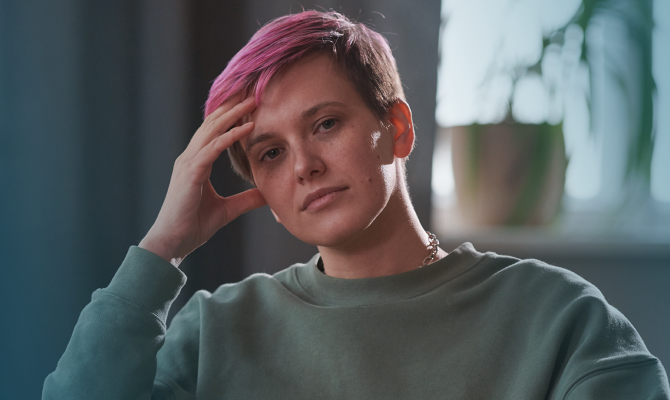Not just muscles - physios treat headaches too
25 May 2023
25 May 2023

What is concussion?
A concussion is essentially a form of mild traumatic brain injury with trauma such as a blow to the head or a fast back-and-forth motion (known as whiplash) affecting the brain.
This injury can then bring on issues to do with brain function, such as headaches, dizziness, nausea and fatigue, which come on due to lower levels of energy in the brain. It can also lead to emotional impacts like mood and cognitive changes, difficulty concentrating and memory lapses.
An important difference between a concussion and more serious traumatic brain injuries is that a concussion is a temporary disruption to brain function - it is transient, and it will improve over time. A big part of our roles as physios and occupational therapists is to reassure people that their symptoms should be temporary and, in time, they will be better.
How do people who have a concussion end up seeing a physio usually?
Often after people have had an accident, for example, a fall at home or a collision on the sports field, and they’re concerned, they may go to A&E. From there, an A&E doctor will refer them to a concussion service, which we’re a part of. A person's GP can also refer them to concussion services.
What can someone expect treatment-wise if they've got a concussion?
We work within a wider multidisciplinary team to get a person with a concussion feeling better, and each specialist involved has an important role to play.
A Habit Health Occupational Therapist is usually the first to see the patient, and they do a very thorough assessment. They talk through the accident and get familiar with any important details that might be there in the background. They talk about what the person is struggling with and what their symptoms are stopping them from doing, for example, things like playing sports or exercising, socialising with friends and whānau or not being able to work. The Occupational Therapist also gives some information about how they can manage their symptoms too.
Following this, a concussion doctor and a neuropsychologist will triage this assessment and decide if their involvement is required.
Next up, the patient will come and see a physio, which I go into more detail on below.
If we find a large proportion of the challenges a patient is experiencing relates to their mood, changes in motivation and their ability to regulate their emotions as effectively, our psychologists can help them address these challenges.
Physios and Occupational Therapists will often play the largest role in getting a person back to their everyday lives and doing whatever they love to do after a concussion.
What is involved with seeing a physio specifically? Like our occupational therapists, we spend a lot of time understanding the injury and helping the patient understand some self-management strategies. We help them renormalise their sleep cycle, as this can be tricky, and advise them on what kind of aerobic exercise they can do.
A lot of it is self-monitoring too. For example, if a patient is used to doing a lot of any activity, such as reading or computer work, we help them find the right level or amount that they should be doing at that point in time. We then try to increase that back to their experience before the concussion gradually.
We do things like treadmill testing to test a patient's heart rate, exertion levels and any symptoms that arise with this to help prescribe appropriate levels of exercise. We often do hands-on work on our patients' necks as people usually will suffer whiplash too, when they sustain a concussion. We also check and clear a patient's balance system that can sometimes be disrupted too.
Concussion patients are usually with us for two to four months - they see us up to a few times a week at first and then less as time goes on, and they are able to self-manage.
If a patient is off work due to an injury, we also help with supporting their return to work. We involve a patient's employer fairly quickly to discuss how we can support a smooth transition back to work. All treatment is fully funded by ACC too.
If you or a loved one has experienced a concussion, we hope this helps you to understand the care pathway and what to expect. All concussion sessions with a physio are referred through a GP or emergency department doctor.
If you need to see a physio for other aches, pains or injuries, you can make a booking here.